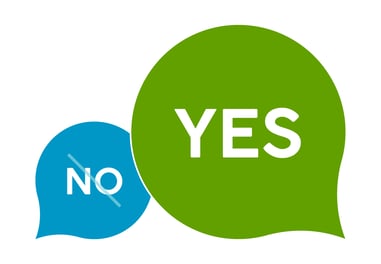
Introduction
Customer questions, concerns and objections are a natural part of the selling process. If your customer isn’t engaging you at this level, then chances are they’re not a serious buyer. The feedback also provides valuable insight into the customer’s interest level, how far along they are in narrowing their search and finally, how close they are to making a purchase decision.
When addressing the customer’s questions and concerns or overcoming objections, focus your attention on their personal situation, individual needs and purchase considerations. This will help you to more effectively leverage the competitive advantages of your products and continue to move the sale forward.
Know Your Competition
Gain a knowledge and an understanding of your local competitors and their products. This allows you to focus on your product’s strengths and key differentiators, particularly when overcoming a competitive obstacle or objection. When analyzing your competition, ask yourself:
- What does my customer consider as an alternative to my products?
- What are the most frequent obstacles and objections that arise when comparing your products to the competition?
- How can you downplay or neutralize them?
- If you’ve lost a similar sale in the past, why? What were the determining factors?
Referencing Your Competitors
- Whatever you say about the competition, favorable or unfavorable, will follow you, not the intended competitor.
- The general rule is if a customer doesn’t mention a competitor, you shouldn’t mention it.
- Avoid generalized negative comments about your competitors, instead focus on the strengths and feature sets of your products.
- Concentrate on explaining your company’s resources and support. Explain why the customer should buy from you and your dealership.
How to Respond
- Cushion an obstacle or objection by restating it in your own words, which usually makes it easier to answer. This also demonstrates that you are listening to the customer and have a genuine interest in what they are saying.
- Turn the objections into a reason for buying—In other words, revisit your customer’s purchase considerations and explain that it is exactly why they should choose your product.
- Compliment the objection—“That’s an excellent question”, “I can understand your concern”, “Recently, I had another customer who raised the same objection…”.
- Allow the customer to answer his/her own objection—Hear-out the customer completely and many times they’ll answer
it on their own. - Dismiss the objection—Only if it is frivolous, meaningless or inappropriate.
When to Respond
- Before the concern/objection is raised—This is appropriate when the objection is commonly asked or when it is appropriate to address a competitive obstacle up-front and get it out of the way.
- Immediately when the concern/objection is raised—This is the best time to address it, then move on.
- After the concern/objection is raised—If you don’t know the answer, don’t guess!
If your answer requires a complicated and lengthy answer, simply suggest to the customer that “that you’ll come to it later”. In many instances the question is either answered further in the customer interview or forgotten.
Best Practices
- Don’t dwell on the negatives! Briefly address the customer’s concerns and objections, then resume the sales interview.
- It is important to hear-out the customer completely before addressing their concerns/objections and avoid the temptation to interrupt!
- Customers typically ask the same questions and have the same concerns and objections time-and-time again. Expect these in advance and prepare by having irrefutable answers that you can use to overcome anything the customer throws at you.
- Avoid expressing your own opinions about a local competitor’s personal character and reputation.
- Avoid knocking a local competitor’s products.
- Avoid confrontation or being argumentative. You may win the argument, but you will most likely lose the sale!
Summary
One of the most important elements of the selling process is establishing a rapport with the customer. As a result, he/she feels comfortable asking questions and raising concerns or objections. This provides the sales consultant with critical insight into what the customer is thinking and where they are in their purchase decision. It also allows the sales consultant to flesh out obstacles and objections earlier, so they don’t come as a surprise later in the selling process.
The most successful sales consultants know their local competitors and can effectively leverage their product’s competitive advantages. They are better prepared to address questions and concerns by doing their homework in advance. They develop irrefutable answers and proven methods to overcome the most frequent and obstacles and objections. Finally, the most successful sales associates are more confident, capable and far more successful at moving the customer down the purchase funnel and closing the sale!


